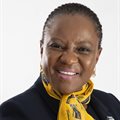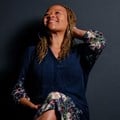#ACACaresCovid19: Where business and creative strategy meet
This interview is also available on YouTube, and at BizTakeouts, via downloadable App, Apple Podcasts, Spotify and IONO.FM.
In the second episode, a conversation between industry leaders Sithembile Ntombela, head of marketing at Brand South Africa and Selae Thobakgale, chief strategic officer at The Odd Number Group and co-founder of The Strategy Network, hosted by Rutendo Nyamuda, on the topic of where business and the creative strategy meet in the time of Covid-19. Here, some key takeouts...
As an official custodian of the nation brand, Brand South Africa has to take care of the reputation of the country's brand and how it is projected. The campaigns that they have been championing, said Ntombela, are really around educating South Africans on how to behave around Covid-19, so that they can combat the influx or the increase of the number of people that are getting infected. So, they started the Play Your Part campaign.
Explaining the challenges they had to overcome to get the message out to rural communities, Ntombela said that through radio, they've been able to disseminate messages that are centred around education. "I think for me, the challenge has really been around the mediums but also the reach because if you look at how government has been trying to access those communities in the Eastern Cape, they have even come up with scooters to try and penetrate those areas, where your ordinary transport is not able to go through the infrastructure and reach those communities."
Thobakgale also told us about some of the projects they’ve been busy with during the lockdown period. A lot of their clients are in retail and their job is to find ways to speak to people but at the same time help the brand meet the bottom line, which is selling whatever product they are selling.
"The challenge that Covid-19 has brought out is really relooking at and getting clients to open up to the fact that their brand purpose is now being put to the test. The consumer, the world, the context that they are living in has changed in a way that they are calling to you to be part of the solution, and it can no longer be about the bottom line alone."
She continued and said that they know that brands that have that added value and brands that have a purpose, historically, have always been brands that connect better with people.
We like to see this is being spoken about on global stages as the best way to approach marketing, but on a daily basis, brands don't really do that and they don't do that well. So this has been an opportunity to really get our clients and brands to step up and say, 'We have a human, national and global crisis,' and 'What do we need to do differently?', ' How do we need to show up?' and more importantly, 'How do we honestly, truthfully, authentically start adding value for our consumers and their lives?' That is the brand work that has been done.Thobakgale said there has been a lot of agility that has been required. "We've had campaigns and brand plans that have set the map about what the year is supposed to look like and Covid and the uncertainty around it has really taken that out of the door, and so it's been reworking those with our clients and saying, 'Alright, this is the new narrative. This is the tonality we feel you should be going with, and these are the different projects and the different solutions we feel you need to start having in society."
She said that that had been a very exciting role to play. "With advertising, you sometimes feel like you're selling your soul a little bit because you're selling products and you're selling things, and you actually start shifting the dial and doing work that starts to add real value, which is amazing."
Talking through the working methods and the objectives of agencies and clients when they meet and how they ought to approach solving these issues, Thobakgale said that Covid-19, Black Lives Matter and in South Africa, gender-based violence, are not briefs or an opportunity, but a calling, a call for you to stand up and play your part. She said you'll find that people might say, it's a brief and it's an opportunity to use it to communicate something that will eventually sell product, but that is not how they approach it.
"It's to go, 'This is what is happening in our society. You are part of that society. You are part of that country and that narrative. What do we do to start shifting that dial? Do we know the needs that your consumers are now having? They might not be able to afford your product anymore. How do you start shifting that and what is the opportunity and how do you play your part as a solution in that?'" She reiterated and explained, "These problems are not briefs. They are not opportunities. They are only opportunities if we look at it as how can we play our part in being a solution."
Ntombela agreed and said the biggest battle and the biggest stumbling block is the mindset.
Transformation has to start from the mind. There is this notion in life that says an idea will come through your mind and then you say it and then eventually you convert it into happening, and what I have been observing is that from a transformation standpoint, we are slacking behind, particularly in the ad industry, and we have to talk about it and be brutally honest. Because when we are brutally honest, that is when we are able to grasp and understand the insights, and when you are able to understand the insights, you are able to give back to ideas and solutions that resonate with people that are going to be remarkable.Thobakgale added that we should not be treating these issues as trends. "I think we lack such a consistency on how we've been tackling these in the past. Like even now, Black Lives Matter is a topic. Covid-19 is the reality that we're living in but we're also seeing Covid-fatigue where we hear, 'I don't want to talk about or hear about this anymore.' Or, 'Black women and women empowerment, I am so tired of hearing about that as a narrative.' People will say, 'Let's move along.' But no, let's actually not move along because we actually have not moved as much as we need to. So until we are moving along, we shouldn't be moving along in terms of talking about it and bringing it to the forefront or standing up and really championing it on whatever platforms that we have as an industry."
Nyamuda said, "You are both black females, so sometimes not everyone around the table will understand where you are coming from as a female or where you are coming from being a black person in South Africa." She asked Ntombela and Thobakgale what the best way to brief people when dealing with clients and agencies is and how they approach this.
Thobakgale said, for her, because of the type of work that she does in getting human insights and understanding people, at the end of the day, beyond titles, you need to remember that you're speaking to people. "You're speaking to the other black woman, you're speaking to the white male in the room. You're speaking to South Africans in the room, and for me, I always approach my work and briefing people from a very human level. I think when we take away the theory and the advertising jargon that we usually speak in boardrooms and bring it down to a human level to say, 'This is the reality and I am bringing that reality and I am representing the reality of people that are not represented and cannot be represented in this room, and I am bringing it to you in a way that is palatable, in a way that has the depth that you're able to understand. In a way that unpacks the nuances, so you don't end up having a commercial of black people singing about soap because the nuances of that require you to actually go, 'Oh, I understand. I have insight. I understand what the humanness, what the depth of this is when we're looking at communication.
"And you know that you're walking into the room, not just as a black person but as a tool to educate and to create the awareness that is required. We have done the work. For me to be an English-speaking, so-called Model C... I have done the work. My mom has done the work of getting me liberated mentally in so many ways. My community has done the work educating me in so many ways. I have done the work to understand the concepts of whiteness, to understand what language I speak in a boardroom, I have earned the privilege to be there."
She said that even though you are meeting people and feel you have entered their world, that you've entered their way of working. "They live in a society that I come from that they may or may not have had the opportunity or they may have had the life experience or just purely because they are from a specific race, they may not understand. The role is for you to be there as an educator, as an emblem, and to do so consistently and to not leave that boardroom until you know that the message is understood, and to be part of the work process every step of the way until it is out into the public."
She said she is proud to be working within an agency that is black. "With an agency that has young people that come from that community, that come from that background, that speak that language, that are South Africa, in terms of the majority of the audience that we are trying to reach. Not to alienate anyone, it's just the depth of understanding of who we, as communicators are trying to connect with essentially. So, yes, you're an educator, you're an emblem, you have a massive role to play in really bringing about the awareness to a place that it hits, it sticks and allows the change to happen from within."
Ntombela said that we are dealing with symptoms of issues that happened then. "But we cannot always say that we are blaming this and that as a reason. Let's get over it and say, 'We are all Africans,' and if we can look at what Africans can do together. I like to approach things from an outcome point of view. I say, imagine what Africa could look like if Africa was united, if Africa was co-ordinated, and if you've got that picture and you paint that picture as Brand South Africa, then we are likely to get more buy-in and more people saying, 'That's the Africa I would like to be a part of.'
On the subject of youth in the boardroom, Thobakgale said, "If we are going to move from where we are to where we want to be, we need your voice as young people. She said: "We need the likes of me, in those boardrooms. We need the likes of me, breaking those boundaries, challenging people, having that conversation, bringing in those new perspectives, and going, 'Have we actually looked at it this way?'"
South Africa is made up mostly of young people, so, we need a voice that represents us as well, and that is important. I think that when you start to let these young people know that their voices are valid, that they're required and important, then you encourage them to actually be courageous enough to take that stand.About post-Covid-19 opportunities, Ntombela said, "Post-Covid there is a huge opportunity for us to tell the story that says, 'What did Covid do to us? In what ways did it change our standard of living or our ways of living?'"
Ntombela said she was having a chat with a friend recently and she said, "Imagine, not being able to do the thing that you were going to do and actually forming a comedy, based on that. The things that we were not able to do due to Covid, and you know what, that's a story. You take a catastrophic moment and you make it work for you in a good way, as long as it's aligned to the brand and it's aligned to what the brand stands for."
This industry-wide initiative for conversations around sustainable solutions to common issues facing SA’s marketers and marketeers, to future-proof the industry, is made possible by the Association for Communication and Advertising. Join the ACA at
www.acasa.co.za | www.bizcommunity.com/ACACaresCovid19.







































